Never before in the history of RVing have options existed for getting to the campsite without the need for gasoline. Now, with the transformative wave of the electric vehicle revolution, we’re just a few years away from the RV landscape to take firm steps into the EV space. Electric cars have already carved out a significant niche, with millions rolling off production lines annually and projections indicating even more robust growth in the years to come. However, translating this electric momentum to the world of recreational vehicles is more complicated, primarily due to the challenges presented by their size and weight. Despite these obstacles, the industry is witnessing a surge of enthusiasm and innovation, with several brands actively developing electric RV prototypes that could very well redefine the future of RV travel.
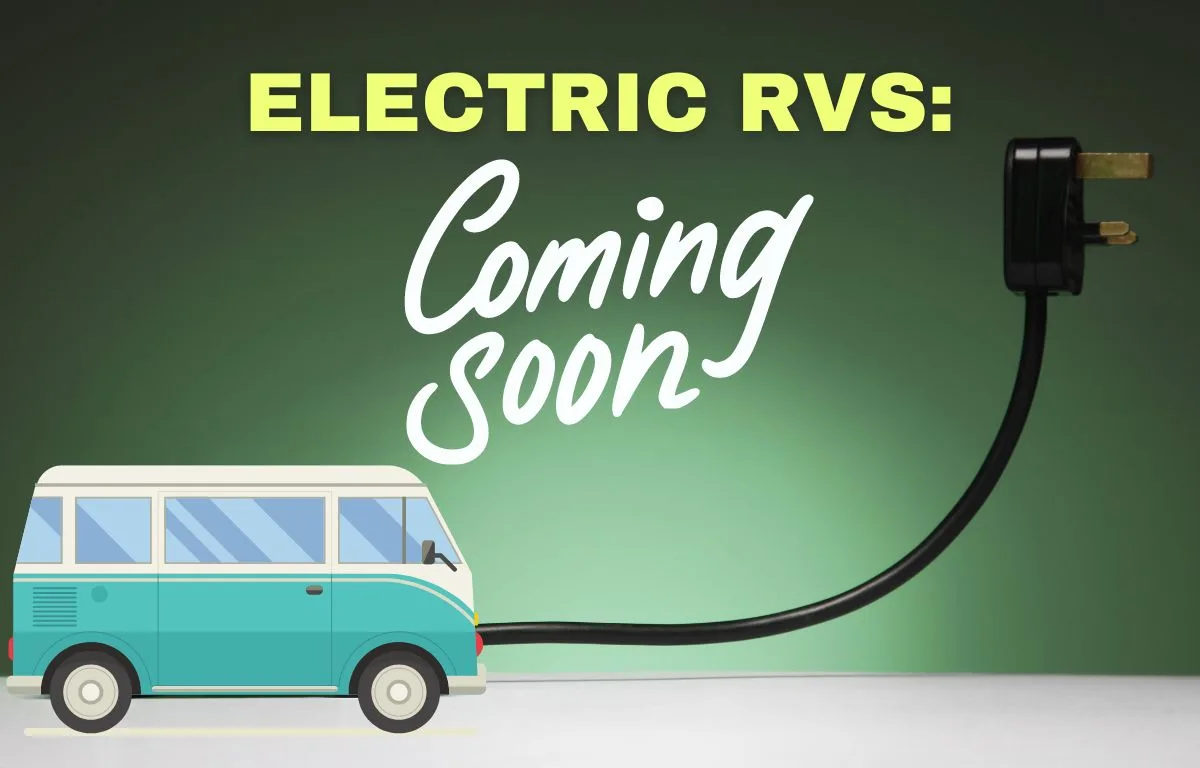
This transition will follow a predictable pattern before we see options available across the board. The first concept vehicles to come to the market will likely be electric campervans. Larger vehicles will take some time until we see battery technology evolve to power a full-sized electric motorhome.
Another technology that is almost ready for deployment is in the towable market. Travel Trailers with electric assist axles, and fully operational battery power while camping, will allow RVers to tow their vehicles with more fuel-efficient or all-electric vehicles. We can expect to see these options available in 2024. While the initial offering will be limited, as technology improves, we can expect to see a wide range of electric RVs with unique features harnessing the power of the batteries, much as we’ve seen in the automobile industry.
Benefits of Electric RVs:
Electric RVs will provide a fresh spin on RV travel, bringing along a myriad of benefits for the traveler who’s looking for a sustainable yet feature-rich way to camp. Electric RVs will pull from existing technologies of electric cars, battery-powered house systems, and existing RVs to create a unique offering to the consumer. An electric RV will offer many benefits to campers, including:
- Clean Energy:
- Electric RVs will significantly reduce carbon footprints as they don’t burn fossil fuels, ensuring zero greenhouse gas emissions.
- One of the primary motivations behind electric vehicles is environmental sustainability. Adopting an electric RV means aligning with this forward-thinking movement.
- Convenience and Savings:
- With no need for gasoline or diesel, travelers can bypass frequent gas station stops.
- Electric-powered RVs, or even electric-assisted tow vehicles, should lower the cost of getting to your destination
- Innovative Charging Options:
- Many electric RVs are being designed to be equipped with solar panels, allowing off-grid charging, a boon for those who love remote adventures.
- Setting up a home charging station ensures that your RV is always ready for the next journey.
- Quiet Operations:
- Electric engines are markedly quieter than their gasoline counterparts, leading to a more peaceful camping experience without loud generators.
- High-tech Features and Design:
- Being at the forefront of technology, electric RVs often boast cutting-edge features and modern design elements.
Drawbacks of Electric RVs:
As with any emerging technology, electric RVs have their own set of challenges that potential buyers should consider. While there’s immense potential, it’s essential to weigh these drawbacks against the benefits when you have the option to purchase one. Some of the disadvantages include:
- Upfront Costs:
- The current pricing of electric RVs will be considerably higher than traditional gas-powered variants.
- Though there might be long-term savings, the initial investment can be a deterrent for many.
- Charging Infrastructure:
- Limited availability of charging stations, especially in remote areas, can pose challenges during long trips.
- Battery Life and Range:
- Given the weight and size of RVs, the current battery technology limits the driving range.
- Long charging times, especially with solar panels, can test one’s patience during travel.
- Size Constraints:
- To optimize battery life, many electric RVs will be designed smaller, which can limit space and amenities.
- Limited Variety:
- The market for electric RVs is still emerging, which means fewer models and choices for potential buyers.
Upcoming Electric RV Releases
In the coming years, we can expect to see a number of new EV RVs released into the market. There are currently several kep concept or near-production vehicles in the works. Below, we’ll take a look at these in a little more detail.
Winnebago eRV2
Winnebago Industries, a subsidiary of Thor Industries, a major RV manufacturer, is testing the waters with an electric RV concept. In 2022, at the Florida RV SuperShow, Winnebago unveiled its groundbreaking all-electric camper van, the e-RV concept vehicle. Fast-forward a year, and a more advanced second-generation prototype has been launched, encompassing even more innovative and eco-friendly features, the eRV2. While still in its developmental stages, Winnebago’s ambitious endeavor signals an impending shift towards greener RV solutions. For the past year, Winnebago has been road-testing the van, putting thousands of miles and hundreds of nights of camping under its belt.
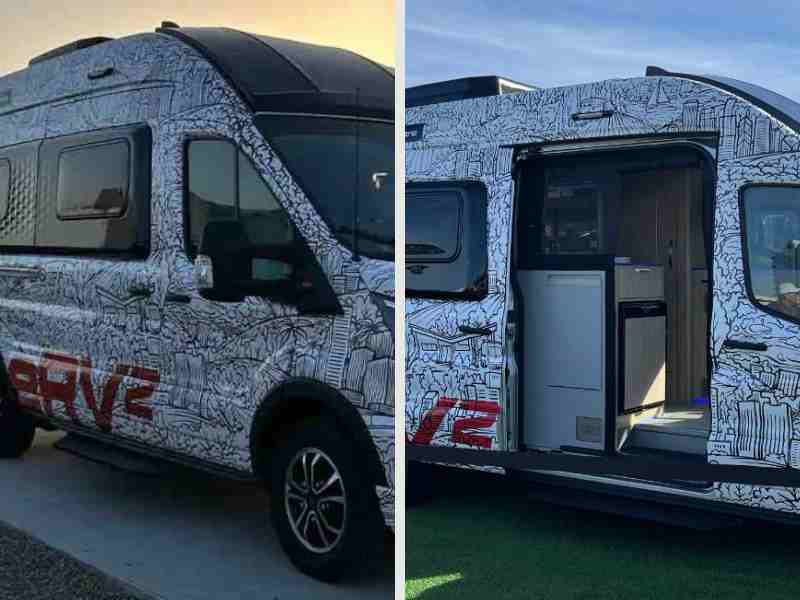
The eRV2 is founded on the Ford Transit Van chassis, which is well known in the Class B RV category. Its power derives from a proprietary IonBlade battery developed in partnership with Lithionics Battery, boasting a battery capacity exceeding 15,000 watt-hours. DC fast-charging support enables a range of approximately 108 miles of range per charge in its 86-kwh battery pack. Additionally, 900-watt solar panels augment the vehicle’s energy reserves. Notably, the slim design of the power cells ensures maximum interior space, seamlessly fitting beneath the van.
While 108 miles may not seem like a lot, and for long road trips it isn’t, they targeted their benchmark for the production model at around a 3-hour drive time, which is common for RVers. This is a marked improvement over the original Winnebago eRV. Additionally, since it’s a camper van, it can more easily charge at existing stations rather than needing a larger sport like a towable RV.
Reflecting influences from Japanese and Scandinavian design philosophies, the eRV2’s interior is characterized by an uncluttered, spacious aesthetic. It offers versatile furniture tailored for both work and relaxation, featuring a unique five-in-one sleep/lounge area and dual convertible workspaces equipped with charging outlets. Catering to the tech-savvy traveler, an integrated high-speed Wi-Fi router ensures continuous online connectivity during camping trips.
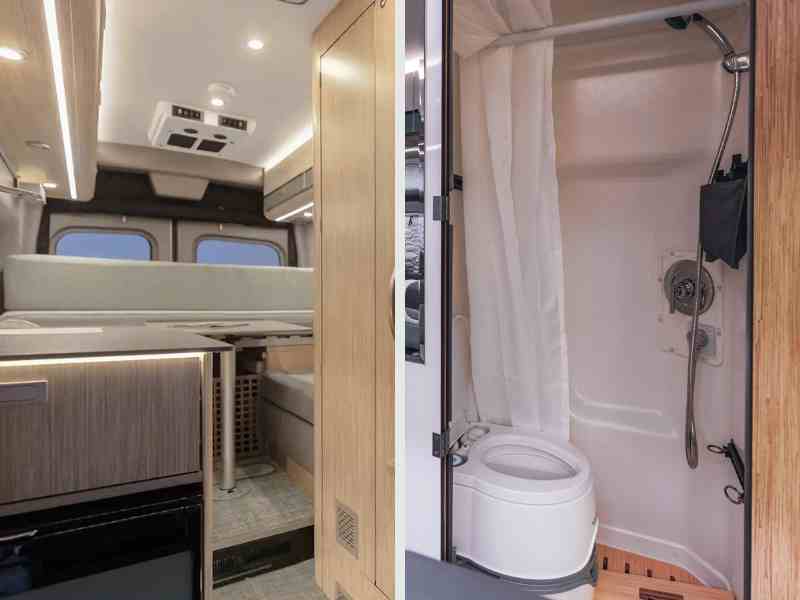
Beyond its electric propulsion, the eRV2 integrates multiple sustainable elements, such as renewable plant material-based seat covers, biodegradable countertops, and recycled materials for various fixtures. Furthermore, adjustable interior lighting minimizes light pollution, further reducing environmental impact. Compared to its 2022 predecessor, the eRV2 offers amplified electric motors producing 266 horsepower, a 30% more efficient 48-volt air conditioner, and enhanced utility features powered directly by the van’s batteries.
During its development, Winnebago emphasized user feedback, conducting comprehensive research involving over 1,200 participants. This unveiled a strong preference for enhanced performance, driver assistance technology, and cost savings in terms of maintenance and fuel. One challenge is the vehicle’s range, which necessitates charging stops approximately every 1.5-2 hours. Winnebago is actively researching ways to extend this. Though the eRV2 has witnessed significant advancements, production remains on hold for now. While you can’t test drive the all-electric e-rv concept vehicle yet, Van life in an electric RV may not be too far in the future.
Key Bullet Points:
- Built on Ford e-Transit Van chassis.
- Uses an IonBlade battery with over 15,000 watt-hours of electricity.
- DC fast-charging allows for an approximate 108-mile range.
- Interior boasts multi-use furnishings and inbuilt high-speed Wi-Fi.
- Enhanced features include stronger electric motors and energy-efficient air conditioning.
Rollaway’s Electric Van Hotel
Rollaway, a cutting-edge sustainable hospitality venture emerging from Silicon Valley, has joined forces with GM’s BrightDrop to present a novel luxury electric van. Designed to revolutionize sustainable travel, this van, dubbed “the hotel room of tomorrow,” seamlessly melds five-star luxuries with a commendable 250-mile travel range on a single charge.
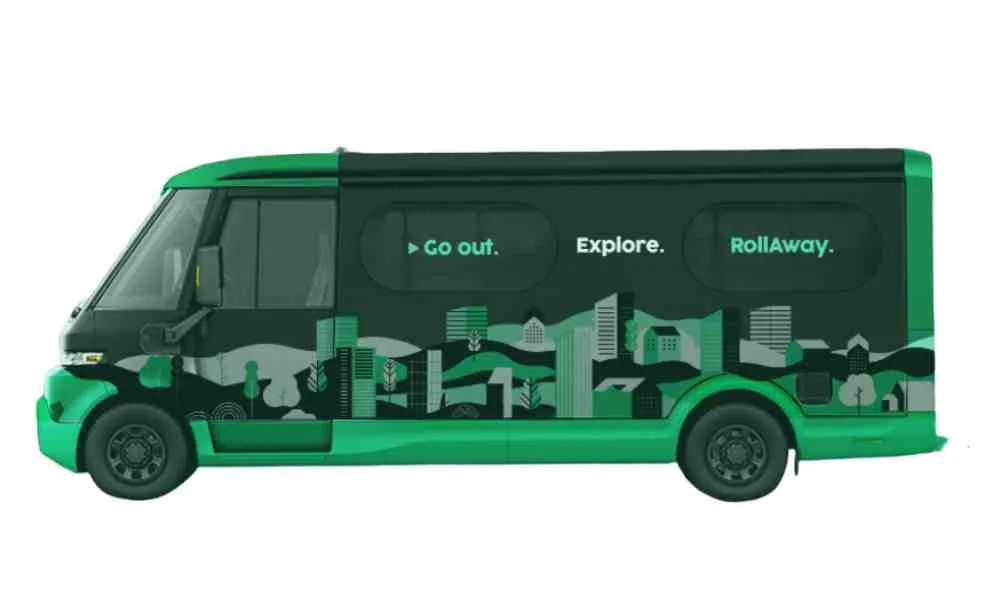
Veering away from conventional lodging options like hotels and Airbnb, Rollaway offers travelers a refreshing alternative. They now have the chance to explore multiple destinations without seeking extra modes of transport. It’s a nice blend of a mobile electric camper and a deluxe hotel room, The electric component was designed through an alliance with BrightDrop, who are known for their sustainable initiatives. BrightDrop has previously partnered with other large companies like Walmart and FedEx, crafting zero-emission EV vans for commercial purposes.
Delving into the features, Rollaway ensures that the electric van hotel room mirrors the extravagance of upscale hotels. Travelers are treated to elite spa-quality toiletries, exclusive YETI products, locally and sustainably procured breakfasts, a comprehensive on-demand app for myriad services, and the latest Starlink technology ensuring uninterrupted high-speed Wi-Fi, even in the most secluded spots.

Rollaway’s lineup comprises the GlampVan tailored for couples, the QuadVan crafted for family getaways, and the opulent LuxVan, akin to a roving luxury suite. Each of these electric vans, with its 250-mile range and fast charging is a big step in the wider adoption of electric RVs/ Rollaway is primed to launch its services in the San Francisco Bay Area and already opening its doors to pre-bookings.
For now, the Rollaway is billed as a mobile accommodation, rather than an RV that can be purchased. However, the technology deployed in the project will likely lead to advancements in the RV industry.

Key Bullet Points:
- Visit multiple destinations without needing additional transportation.
- Five-star amenities include spa-grade toiletries and on-demand apps for room service.
- Three accommodation options: GlampVan, QuadVan, and LuxVan.
- Initiating services in the San Francisco Bay Area with a 250-mile travel range.
Bowlus Electric Travel Trailers
Bowlus, headquartered in Oxnard, California, and renowned for its luxury RVs, has made a groundbreaking move towards a fully electric RV. Bowlus released the first electric travel trailer, the Bowlus Volterra. Since its release, the company expanded the electric fleet to also include the Terra Firma and Heritage models. While the camper trailer doesn’t use electricity for towing, it is designed to be self-sustaining off the vehicle’s built-in battery system.
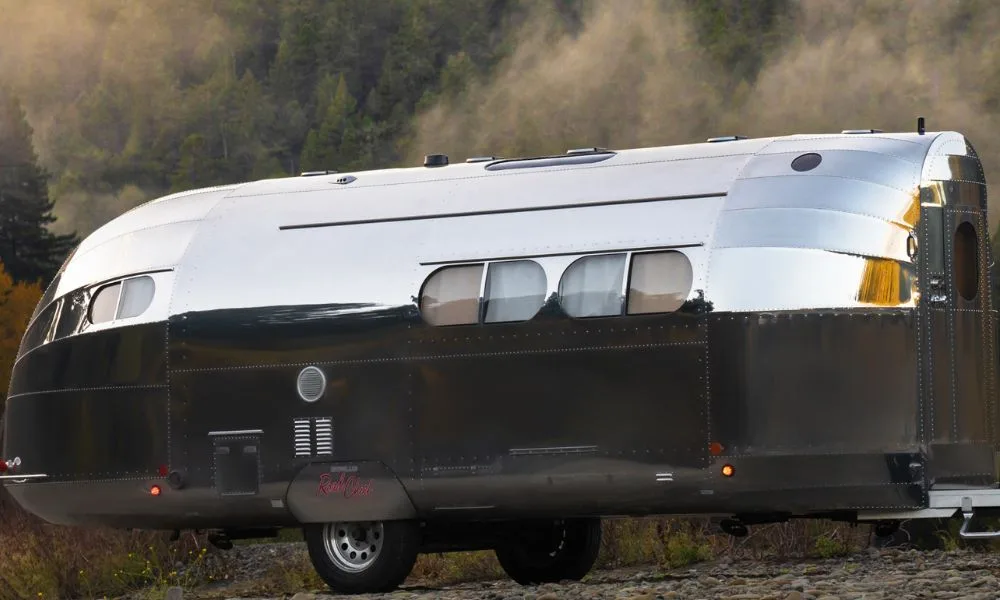
Setting itself apart in the electric RV segment, Bowlus attributes its dominance to its unique aerodynamic design. The RV is crafted to be exceptionally lightweight, weighing between 2,500 lb. and 4,000 lb. — nearly half that of its counterparts. This featherweight design means a vast array of electric vehicles can tow the Bowlus, offering a matchless zero-emission luxury camping experience. When equipped with a tow vehicle like the Ford F-150 Lightning, RVers can have a fully electric camping rig. The Bolus is also designed to provide an emergency charge for the tow vehicle if needed.
Bowlus also emphasizes energy efficiency and self-reliance. Integrated with the cutting-edge Bowlus Power Management System, which boasts impressive storage of up to 17 kWh depending on the model, and paired with the Bowlus Aersolar Solar, RVers can set out without being tethered to the grid or traditional campgrounds. This commitment to innovative solutions isn’t new for Bowlus, which in 2016, debuted the RV industry’s first lithium-powered model capable of running air conditioning off-the-grid.

Geneva Long, the enterprising CEO of Bowlus, summed up the firm’s eco-centric vision: “Shifting to a fully electric lineup isn’t a mere strategy—it’s about sculpting a new industry paradigm. While many RV makers remain mired in archaic technologies, Bowlus is ever-evolving. Imagine enjoying nature’s tranquility uninterrupted by generator hums; that’s the allure of full electrification.”
With a rich history dating back to 1934, Bowlus is known for its distinctive design, marrying contemporary features like over-the-air updates, advanced communication systems, luxury amenities, and exquisite living spaces. Paying homage to its roots as the first aluminum-riveted travel trailer, Bowlus remains steadfast in its mission to redefine luxury travel, as evidenced by the recent launch of the Heritage edition with a more inviting starting price of $159,000. The Volterra is still very expensive costing over $300,000. As of 2023, it’s the only production electric RV available today.
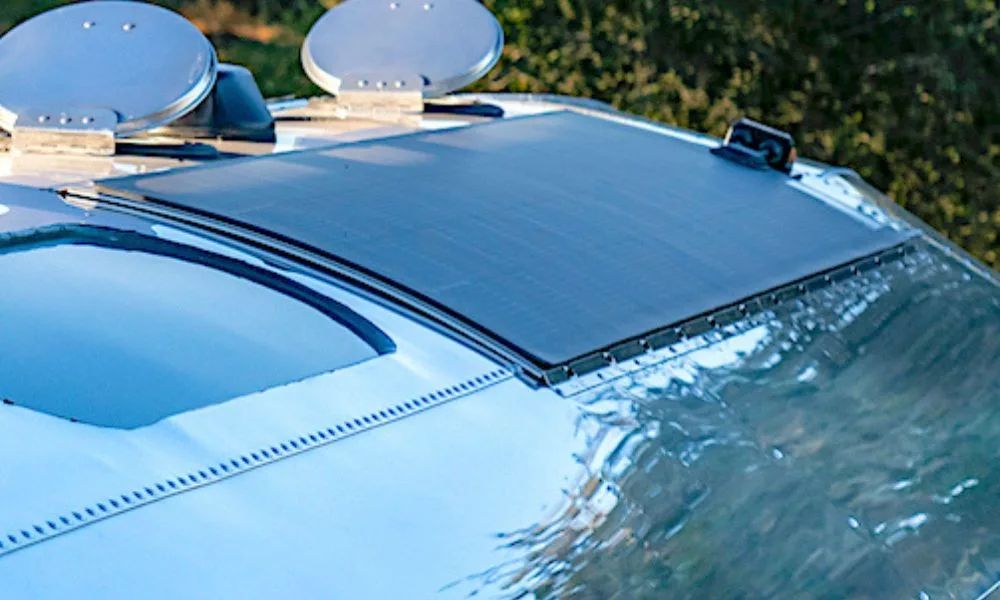
Key Bullet Points:
- Aerodynamic and lightweight design for easy towing by other electric vehicles.
- Energy-efficient with the capability to function off-grid.
- Bowlus offers a variety of models, including the Volterra, Terra Firma, and Heritage editions.
Lightship L1 RV
One of the most exciting developments in the electric RV sphere is Lightship, a new RV startup hoping to transform the industry. Born from the observations of Ben Parker, a dedicated battery engineer, the vision of Lightship emerged amidst the smog of emissions from food trucks parked outside Tesla. Teaming up with Toby Kraus, a fellow Tesla visionary, the pair aimed to craft an RV emphasizing sustainable travel.
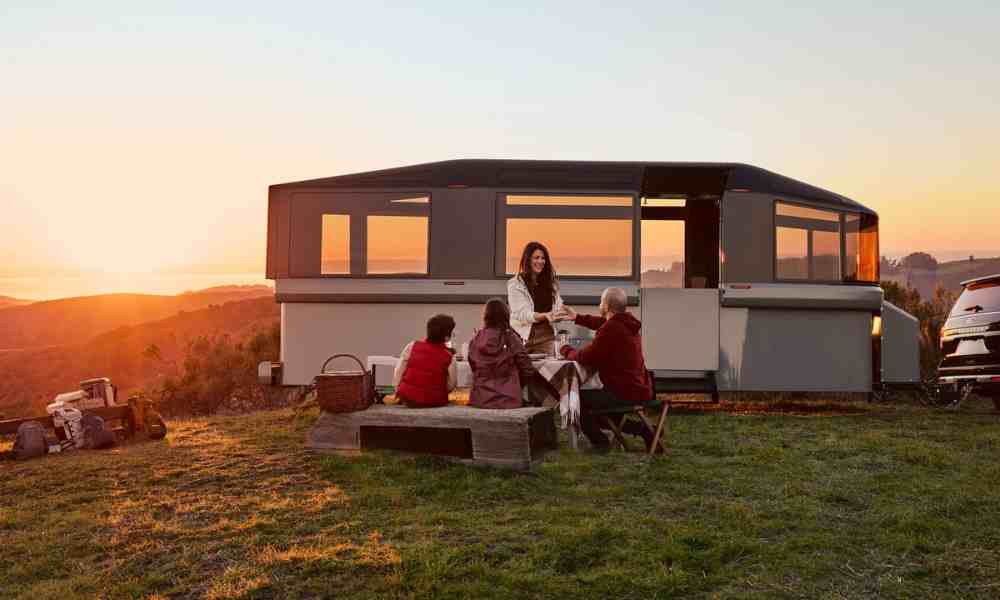
The L1 is the embodiment of this dream. It is much different than a regular RV, epitomizing a new age of camping. By incorporating state-of-the-art developments in aerodynamics, electric efficiency, and renewable energy, the L1 breaks free from the traditional RV mold. Its design, which focuses on modularity and aerodynamics, also integrates an all-electric powertrain, facilitating longer travels with fewer recharge breaks. In essence, the towable vehicle will help propel itself on the road.
The company says the L1’s design is three times more aerodynamic than a traditional travel trailer, which is a big deal when it comes to range and efficiency. When paired with an electric vehicle, and its integrated electric drivetrain, range anxiety for towing will be greatly diminished. For example, an electric truck like the Rivian L1T would struggle to tow a traditional travel trailer of this size 150 miles. However, when combined with Lightship, a 300-mile range truck can tow it 300 miles. The trailer negates any range loss from towing a heavy load. This technology is crucial for towables to achieve longer ranges when equipped with an electric tow vehicle.
Beyond its technological advancements, the L1 is fitted with solar panels, and the vehicle ensures an added dose of renewable energy, freeing travelers from the shackles of gasoline or propane generators. Internally, the L1 offers a modern and spacious living area, with ample space to accommodate 4-6 individuals. The modularity of the Luightship is really impressive. It has an adjustable height ranging from 6 feet 9 inches while in transit to 10 feet when stationed.
When compared to other trailers, like the Bowlus, it’s economically priced at $125,000, with potential reductions to $118,400 after tax credits. Production is slated for late 2024. Following the successful completion of a Series A funding round and an initial seed round, Lightship stands on a solid financial foundation. RV enthusiasts can secure their L1 reservations with a deposit of $500.
In essence, Lightship’s L1 not only challenges but reconstructs our perceptions of the RV industry. This RV, with its blend of design sophistication, green innovation, and advanced tech, is poised to be the electric RV to beat in the future. Follow Lightship online for the latest developments.
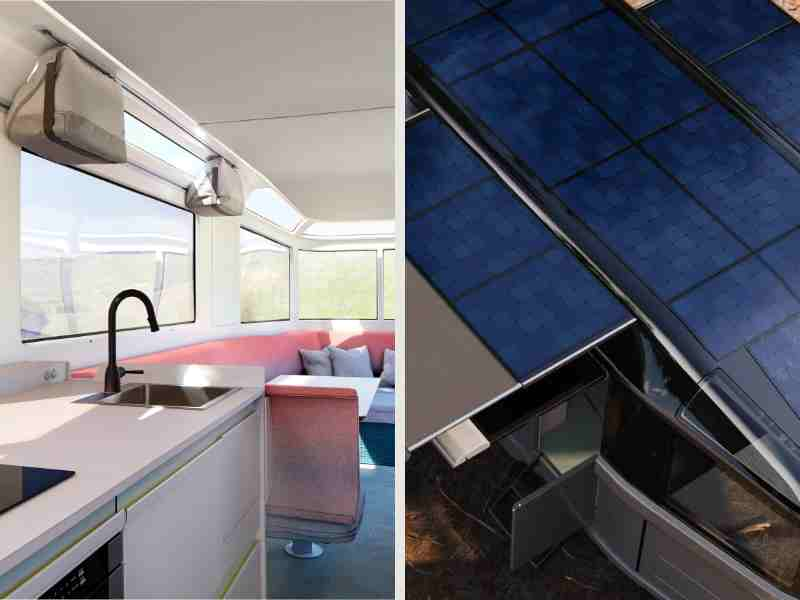
Key Bullet Points:
- Unique aerodynamic and modular design promises near-zero range loss when towing.
- Rooftop solar panels provide an additional 3 kW of renewable energy.
- Set to start production in late 2024, with a starting price of $125,000.
Summary
As these innovative efforts illustrate, the electric RV revolution is not a far-off dream, but an emerging reality. While challenges such as battery range and charging infrastructure persist, the good news is that RV manufacturers in the United States are working on viable solutions, as evidenced in their initial releases. The future of RVing is electric, offering travelers a more sustainable and campable option for exploring the great outdoors.
While electric RVs might currently be in their infancy, marked by challenges like limited driving range, substantial initial costs, and a small selection of models, the broader trajectory suggests a brighter, more electrified future for the RV community. The electric vehicle industry is rapidly evolving, characterized by constant advancements in battery technology, increasing charging infrastructures, and an unwavering industry commitment to advancement. It’s only a matter of time before these benefits cascade down to electric campers. Early endeavors by prominent brands offer a promising preview of what lies ahead. We are on the cusp of an era where electric RVs may be a common siting at campgrounds near you in the not-too-distant future.



